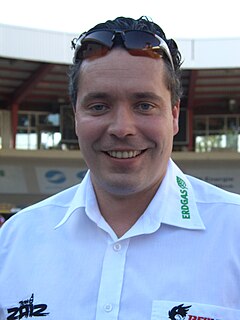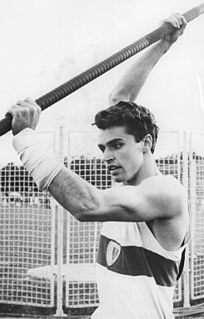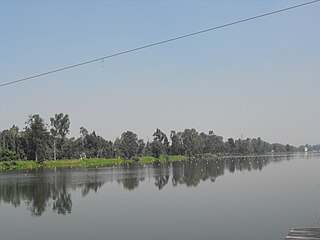The men's team pursuit event in cycling at the 2004 Summer Olympics consisted of matches between two teams of four cyclists. The teams started at opposite ends of the track. They had 16 laps in which to catch the other cyclist. If neither was caught before one had gone 16 laps, the times for the distance were used to determine the victor. The Australia-Great Britain rivalry continued in an event which saw a new world record.

The men's 200 metre freestyle event at the 1992 Summer Olympics took place on 26 July at the Piscines Bernat Picornell in Barcelona, Spain. There were 55 competitors from 39 nations, with each nation having up to two swimmers. The event was won by Yevgeny Sadovyi of the Unified Team; it was the first victory in the men's 200 metre freestyle by an athlete from the former Soviet Union since Moscow 1980. Anders Holmertz of Sweden repeated as the silver medalist, becoming the first man to win multiple medals in the event. Antti Kasvio earned a bronze medal in Finland's debut in the event.
These are the results of the men's individual pursuit at the 1976 Summer Olympics in Montreal, Quebec, Canada, held from 20 to 22 July 1976. There were a total number of 27 participants in the Olympic Vélodrome.
These are the official results of the Men's 4.000m Team Pursuit at the 1976 Summer Olympics in Montreal, Quebec, Canada, held on 23 and 24 July 1976. There were 64 participant from 16 nations. In the first round each team raced alone, with the first eight teams qualifying for the quarterfinals.

The men's team pursuit competition at the 2006 Winter Olympics in Turin, Italy, began on 15 February at Oval Lingotto. The team pursuit consisted of a qualifying round, then a series of elimination races, with the winners of the elimination races progressing to the next round of the knockout phase.
The women's team pursuit competition at the 2006 Winter Olympics in Turin, Italy, began on 15 February at Oval Lingotto. The team pursuit consisted of a qualifying round, then a series of elimination races, with the winners of the elimination races progressing to the next round of the 'knockout phase'.
The men's team pursuit event in cycling at the 2000 Summer Olympics was held on Sunday, 17 September, and Monday, 18 September 2000 at the Dunc Gray Velodrome. The competition consisted of matches between two teams of four cyclists. The teams started at opposite ends of the track. They had 16 laps in which to catch the other cyclist. If neither was caught before one had gone 16 laps, the times for the distance were used to determine the victor.

The men's sprint at the 1992 Summer Olympics (Cycling) was an event that consisted of cyclists making three laps around the track. Only the time for the last 200 metres of the 750 metres covered was counted as official time. The races were held on Tuesday, July 28, Wednesday, July 29, Thursday, July 30 and Friday, July 31, 1992, at the Velòdrom d'Horta. There were 23 competitors from 23 nations, with each nation limited to one cyclist. The event was won by Jens Fiedler of Germany, the first victory in the men's sprint for Germany as a unified nation since 1936. Gary Neiwand of Australia took silver, the third time that nation had a runner-up in the event; Neiwand was only the fourth man to win multiple medals in the sprint. Canada earned its first medal in the men's sprint with Curt Harnett's bronze.

The men's hammer throw competition at the 1968 Summer Olympics in Mexico City, Mexico took place on October 16–17. There were 22 competitors from 12 nations. The maximum number of athletes per nation had been set at 3 since the 1930 Olympic Congress. The event was won by Gyula Zsivótzky of Hungary, who had taken silver in both 1960 and 1964; he was the third man to win three medals in the hammer throw (after John Flanagan and Matt McGrath. Zsivótzky defeated defending champion Romuald Klim of the Soviet Union, who earned silver this time to become the sixth man to win multiple medals in the event. Bronze went to Lázár Lovász of Hungary.

The men's pole vault was one of four men's jumping events on the athletics program at the 1968 Summer Olympics. The competition had two rounds, qualifying and a final, which were held on 14 and 16 October respectively at the Estadio Olímpico Universitario in Mexico City. Twenty-three athletes from 15 nations competed. The maximum number of athletes per nation had been set at 3 since the 1930 Olympic Congress. The event was won by Bob Seagren of the United States, the nation's 16th consecutive victory in the men's pole vault. Claus Schiprowski of West Germany took silver, while Wolfgang Nordwig of East Germany took bronze—the first medals for each of those nations as separate teams, though two West German vaulters had earned silver and bronze for the United Team of Germany in 1964.
The men's team pursuit event in cycling at the 1996 Summer Olympics competition consisted of matches between two teams of four cyclists. The teams started at opposite ends of the track. They had 16 laps in which to catch the other cyclist. If neither was caught before one had gone 16 laps, the times for the distance were used to determine the victor.

The men's sprint was a cycling event held at the 1968 Summer Olympics in Mexico City, Mexico, held on 18 to 19 October 1968. There were 47 participants from 28 nations. Each nation was limited to two cyclists. The event was won by Daniel Morelon of France, his second consecutive medal and first gold; it was also France's world-leading sixth victory in the men's sprint. His countryman Pierre Trentin, who had lost the bronze medal match to Morelon four years earlier, this year won it against Omar Pkhakadze of the Soviet Union. Between the French cyclists was silver medalist Giordano Turrini of Italy, extending that nation's streak of top-two results in the event to six Games.
These are the official results of the men's individual pursuit at the 1968 Summer Olympics in Mexico City, Mexico, held on 17 and 18 October 1968. There were 28 participants from 28 nations.
These are the official results of the Men's individual pursuit at the 1972 Summer Olympics in Munich, West Germany, held on 31 August and 1 September 1972. There were 28 participants from 28 nations.
These are the official results of the men's team pursuit at the 1972 Summer Olympics in Munich, West Germany, held from 2 to 4 September 1972. There were 90 participants from 22 nations.

The men's coxed four competition at the 1968 Summer Olympics took place at Virgilio Uribe Rowing and Canoeing Course, Mexico City, Mexico. It was held from 13 to 19 October and was unexpectedly won by the team from New Zealand, which secured the country its first Olympic rowing gold medal. Thirteen teams from 13 nations attended the competition. East Germany earned its first medal in its debut in the event, taking silver. Switzerland took bronze, its first medal in the men's coxed four since 1952.

The men's eight competition at the 1968 Summer Olympics took place at Virgilio Uribe Rowing and Canoeing Course, Mexico City, Mexico. It was held from 13 to 19 October and was won by the team from West Germany, with the teams from Australia and the Soviet Union claiming silver and bronze respectively. It was West Germany's first appearance as a separate nation, though the United Team of Germany had won gold in 1960 and silver in 1964, with West Germans making up those teams. The silver medal was Australia's best result yet in the event; the nation had previously taken bronze in 1952 and 1956. The Soviet Union reached the podium in the men's eight for the first time since earning silver in 1952. Twelve teams from 12 nations attended the competition. Five of the teams replaced a total of five rowers during the competition, making for a total of 113 rowers who participated in the races.

The men's coxed four (M4+) competition at the 1976 Summer Olympics took place at the rowing basin on Notre Dame Island in Montreal, Quebec, Canada. It was held from 18 to 25 July and was won by the team from Soviet Union. There were 14 boats from 14 nations, with each nation limited to a single boat in the event. The victory was the Soviet Union's first medal in the men's coxed four. East Germany took its third consecutive silver medal, with entirely different crews each time. The defending champion West Germany received bronze this time. Hans-Johann Färber, the only rower from the 1972 gold medal team to return, became the fifth man to earn multiple medals in the event.

The men's coxed pair competition at the 1984 Summer Olympics took place at Lake Casitas, California, United States. It was held from 31 July to 5 August. There were 12 boats from 12 nations, with each nation limited to a single boat in the event. The event was won by the Italian crew, brothers Carmine Abbagnale and Giuseppe Abbagnale and coxswain Giuseppe Di Capua. It was Italy's first victory in the event since 1968 and third overall, tying the United States and East Germany for most among nations to that point. The Abbagnale brothers and Di Capua would go on to repeat as champions in 1988 and take silver in 1992. The Romanian crew of Dimitrie Popescu, Vasile Tomoiagă, and cox Dumitru Răducanu took silver. Americans Kevin Still, Robert Espeseth, and cox Doug Herland took bronze. The three-Games gold-medal streak for East Germany ended with that nation joining the Soviet-led boycott.

The men's coxed pair competition at the 1968 Summer Olympics took place at Virgilio Uribe Rowing and Canoeing Course, in the Xochimilco borough of Mexico City. It was held from 13 to 19 October. There were 18 boats from 18 nations, with each nation limited to a single boat in the event. The event was won by the Italian crew, rowers Primo Baran and Renzo Sambo and coxswain Bruno Cipolla; it was Italy's first victory in the event since 1920 and second overall. The Netherlands made the podium for the second consecutive Games, though with an all-new team: Herman Suselbeek, Hadriaan van Nes, and cox Roderick Rijnders took silver. A Danish boat medaled in the event for the first time since 1952, with Jørn Krab, Harry Jørgensen, and Preben Krab earning bronze. The American medal streak of three Games ended with the United States boat placing fifth.









